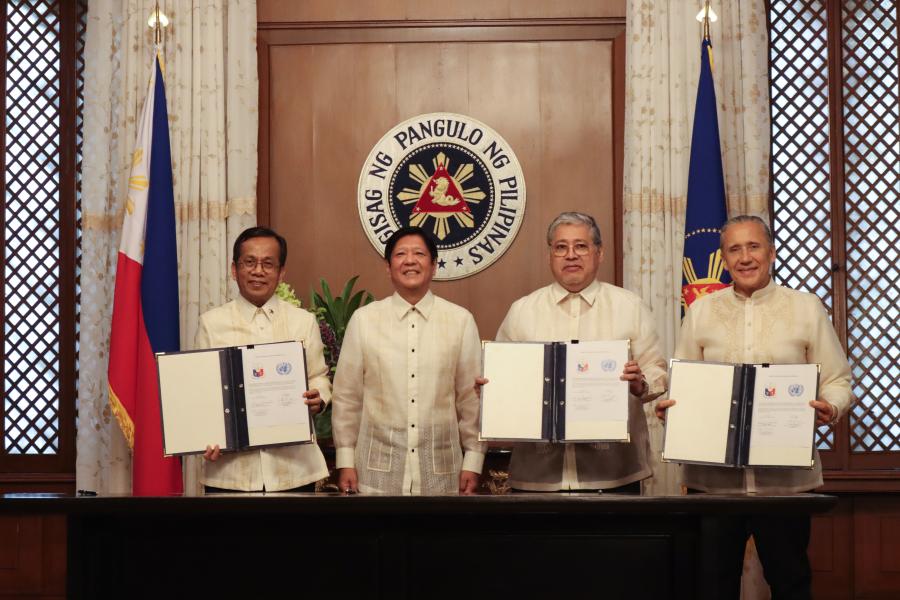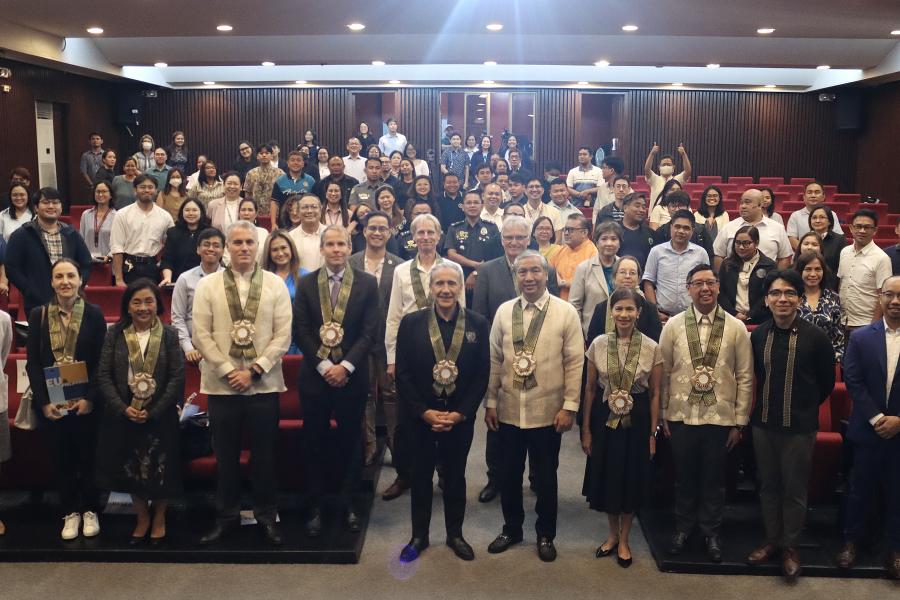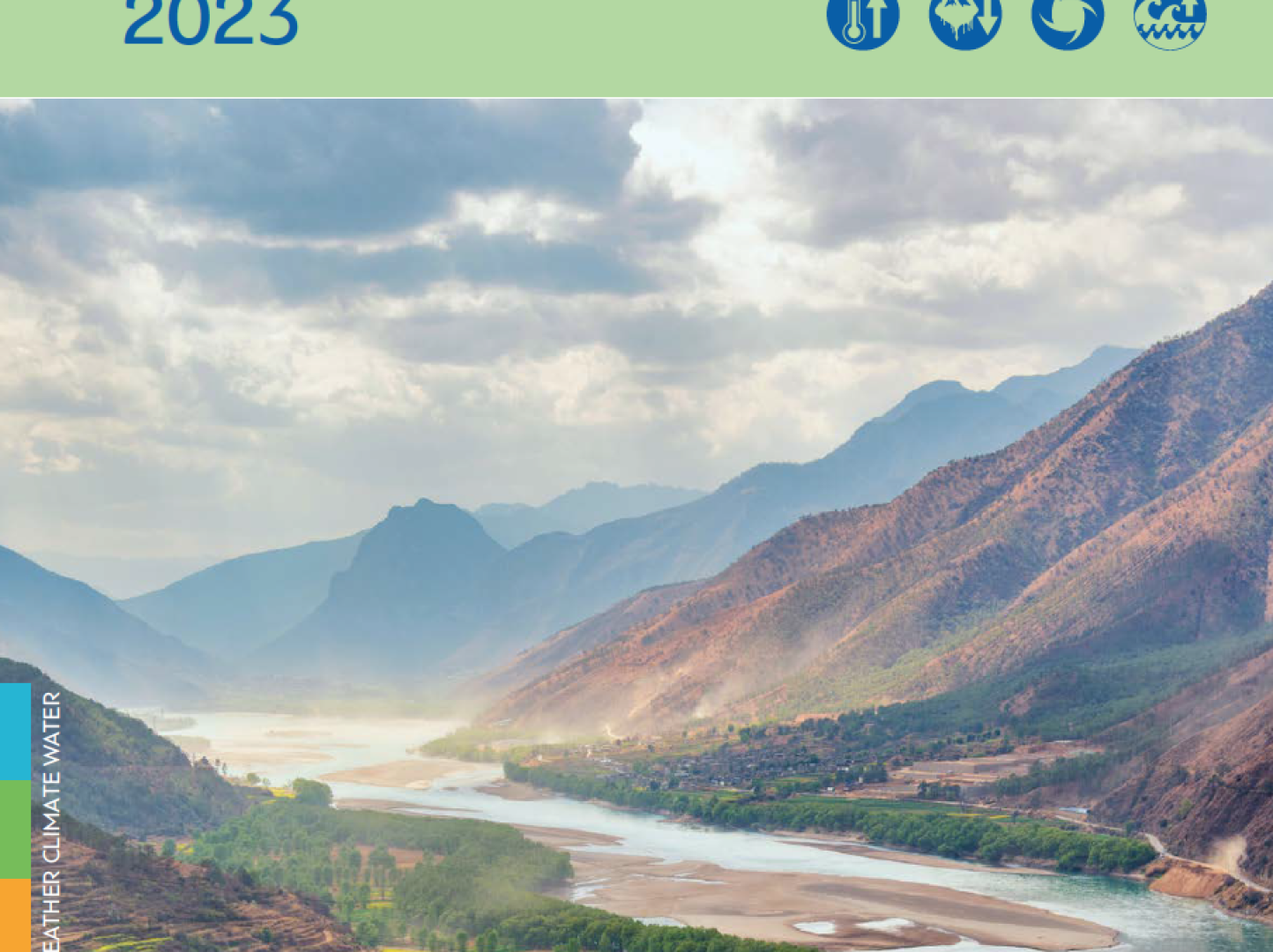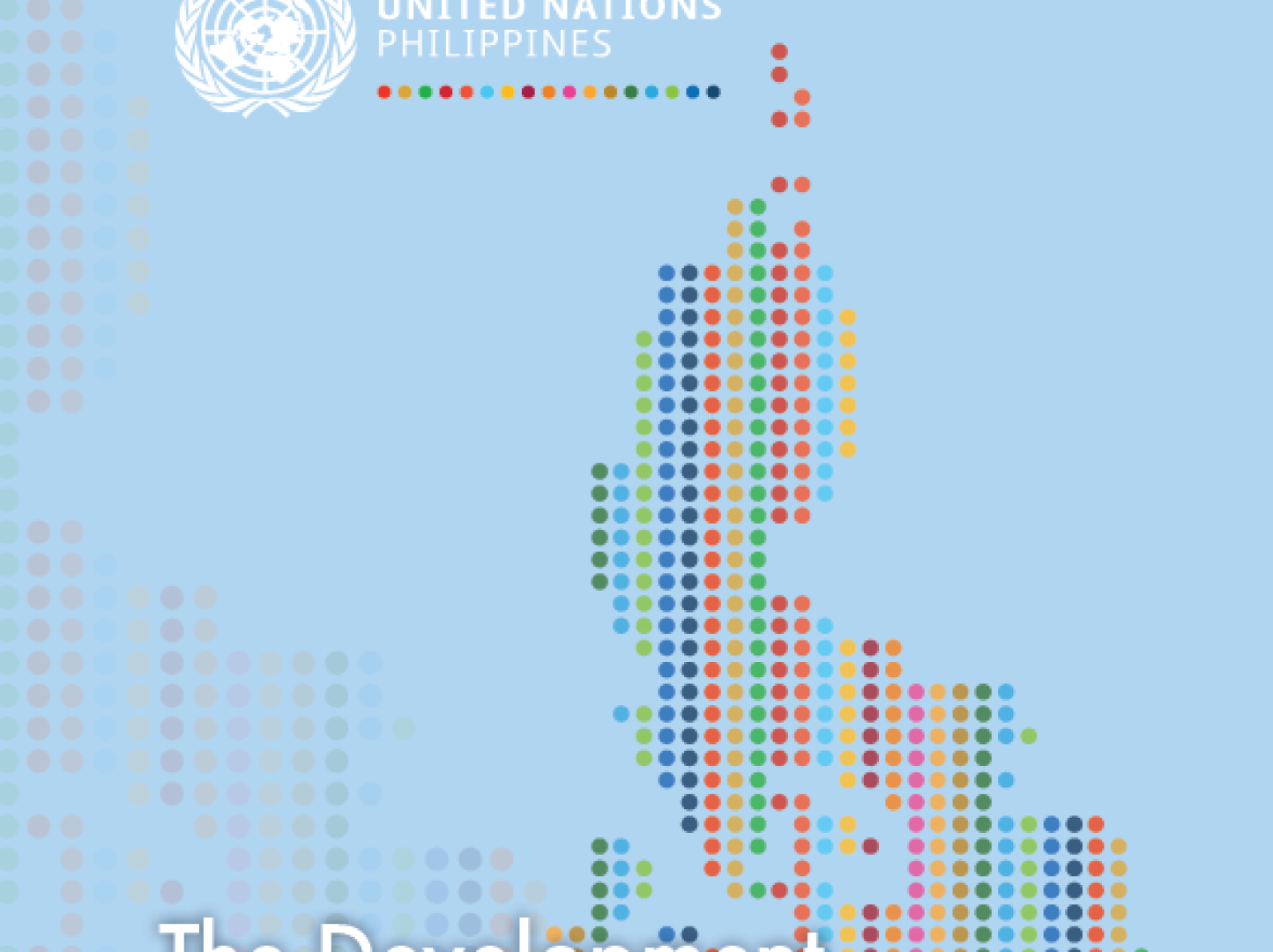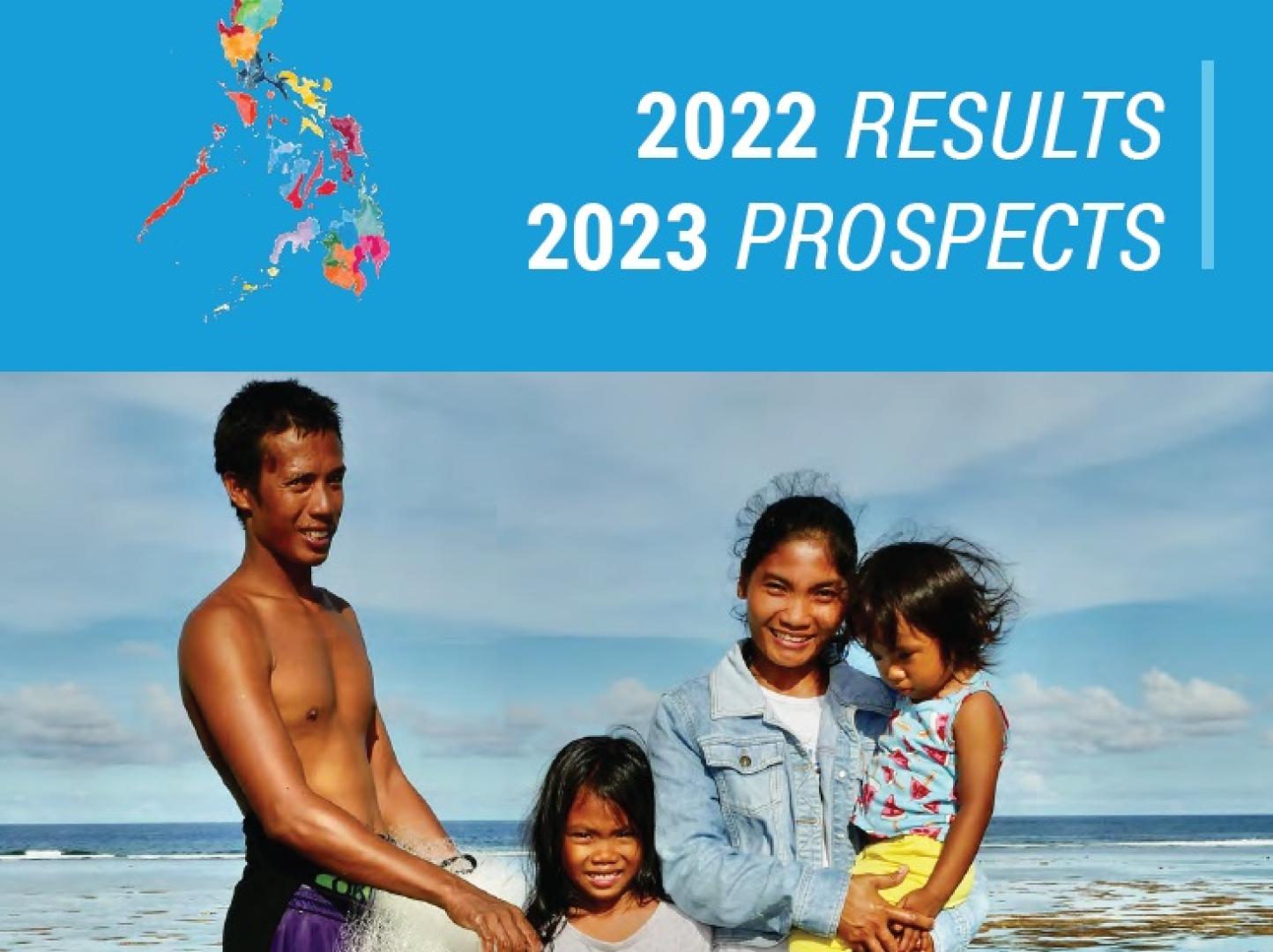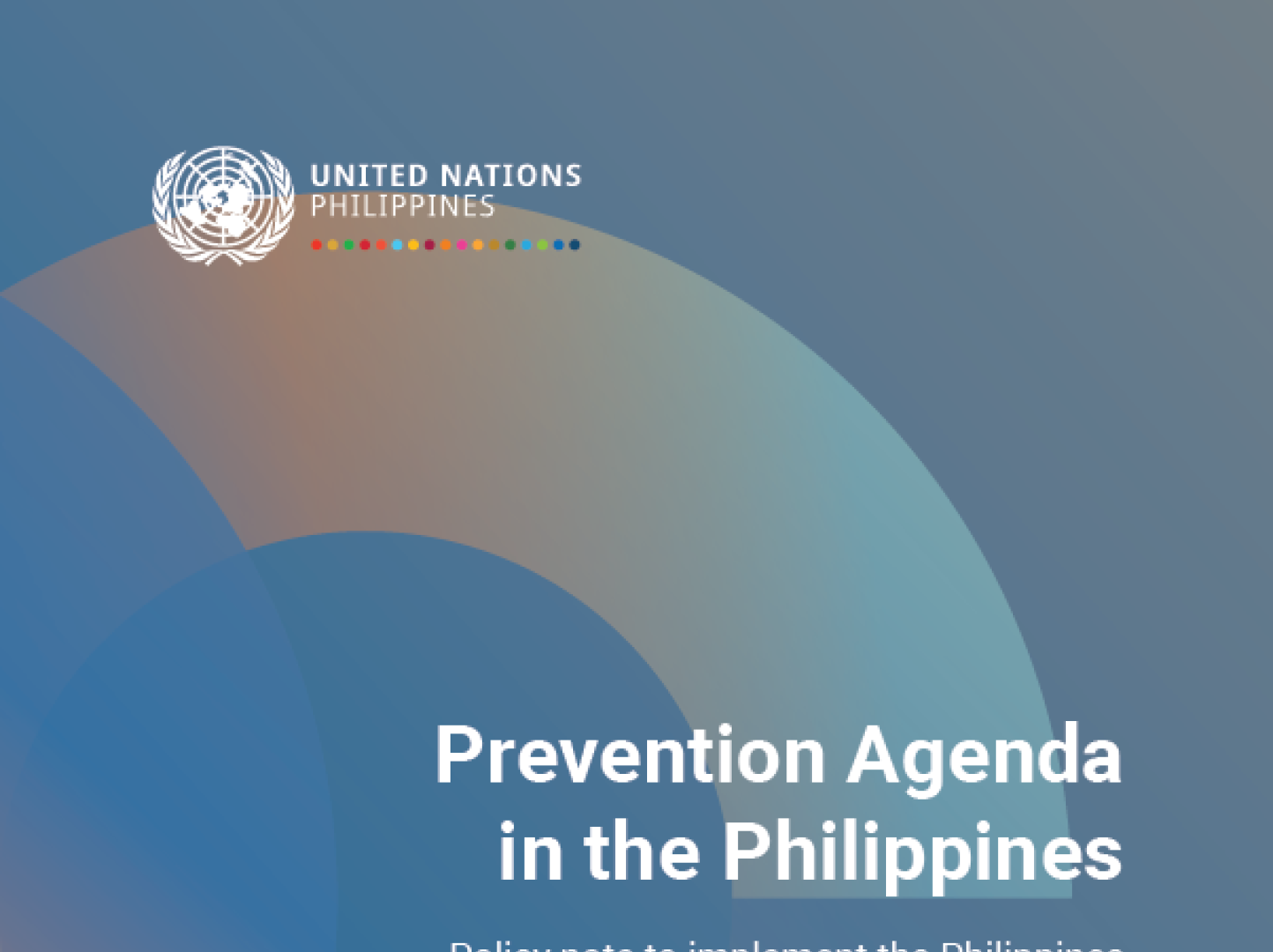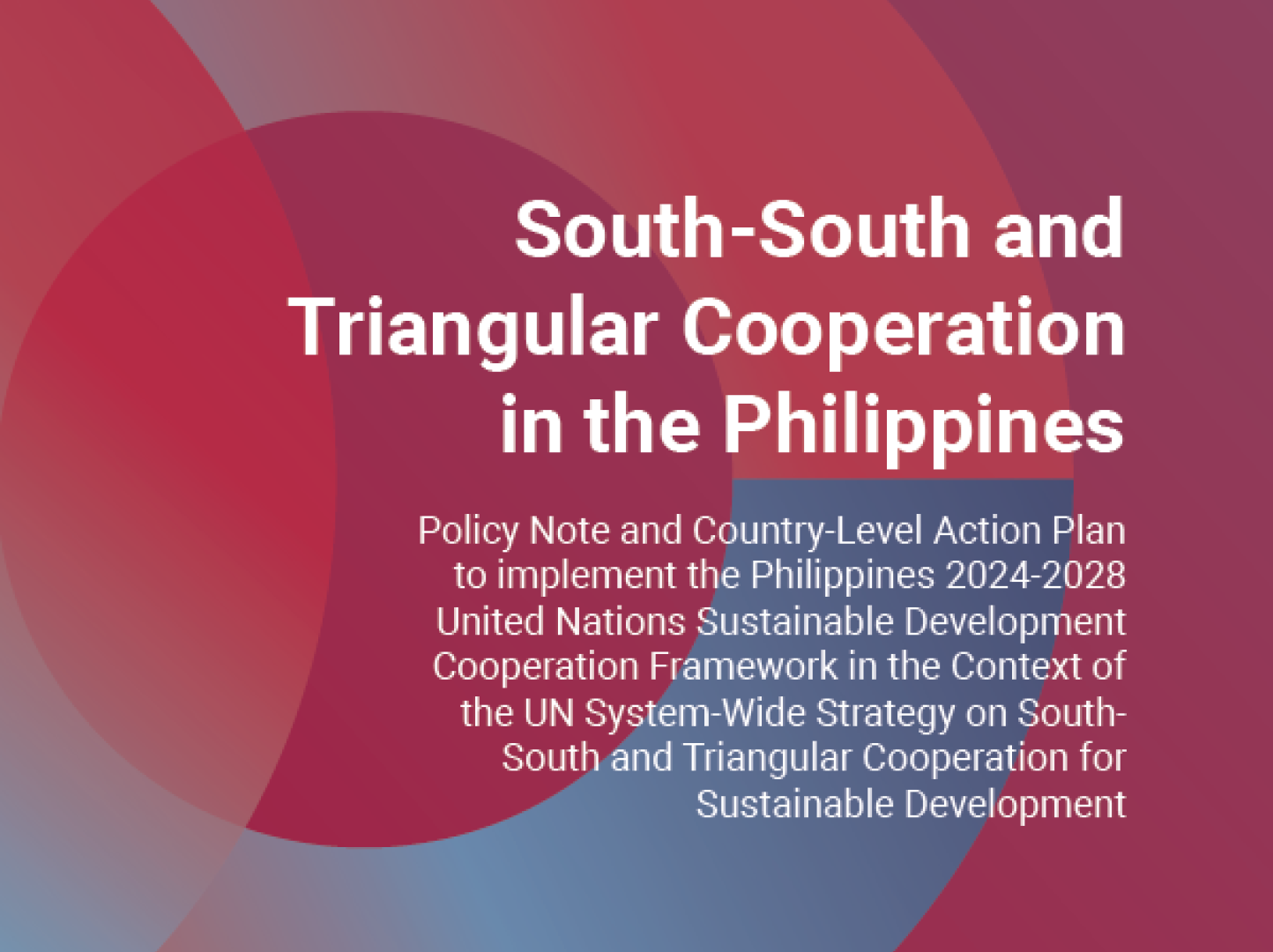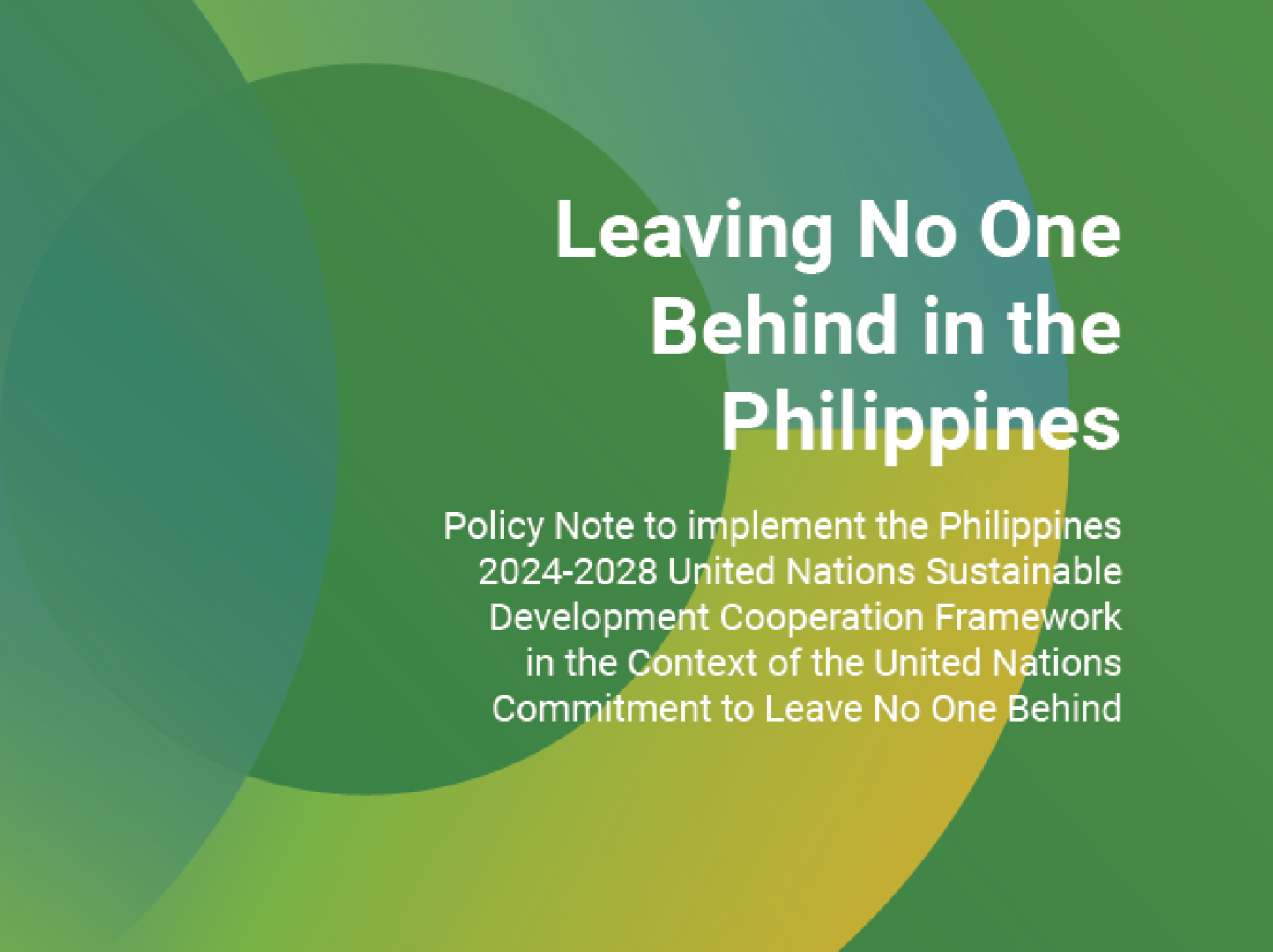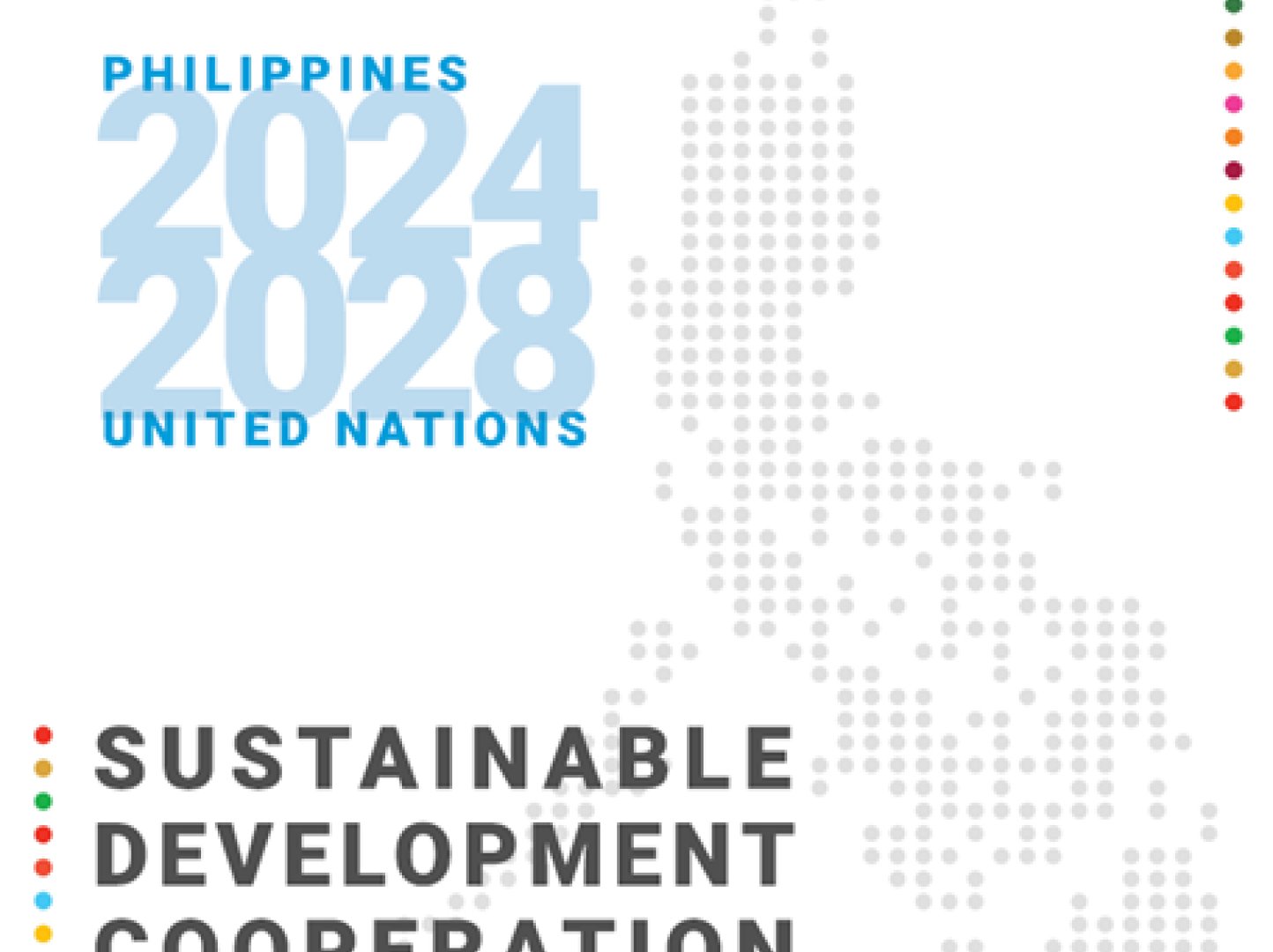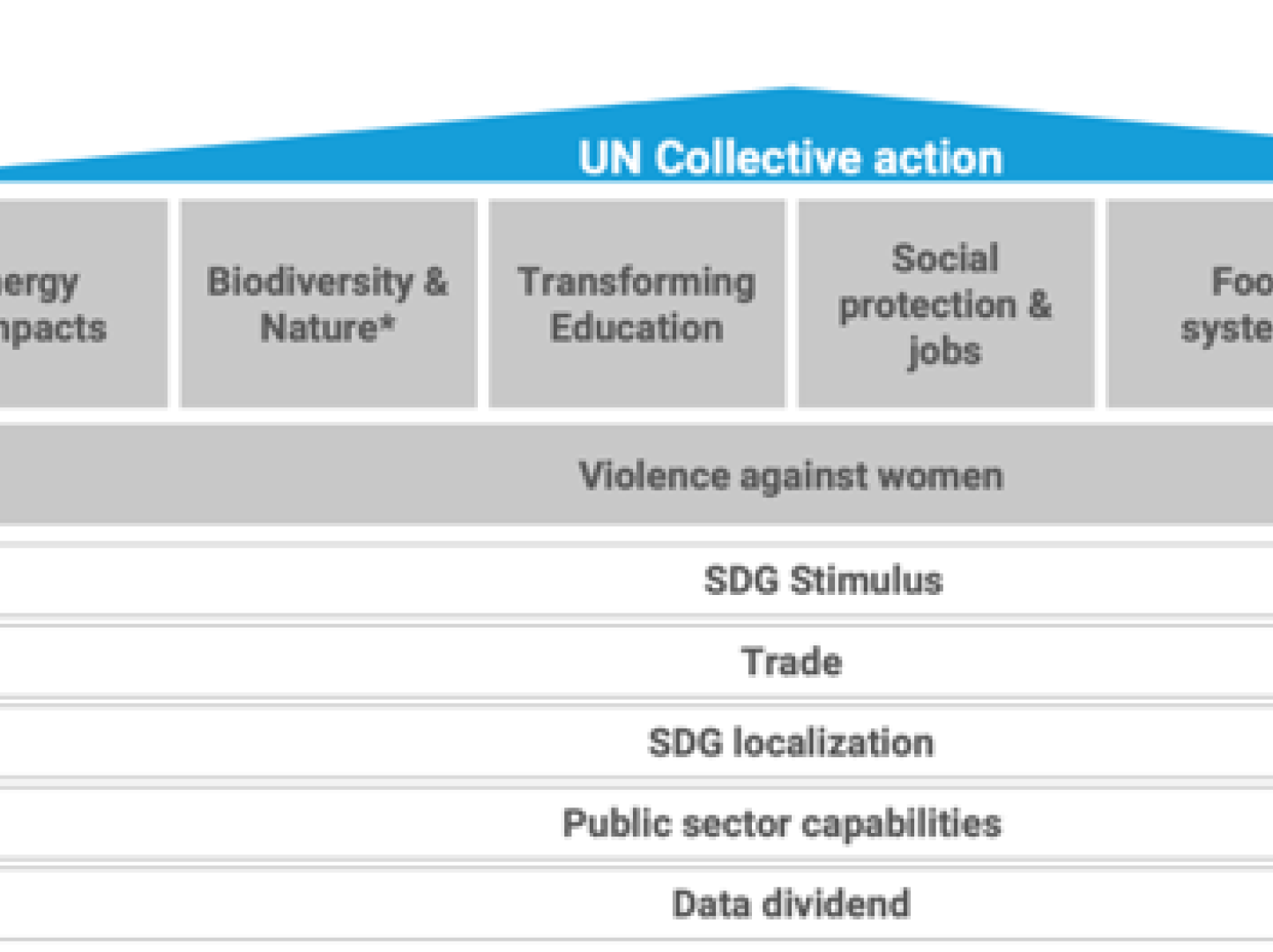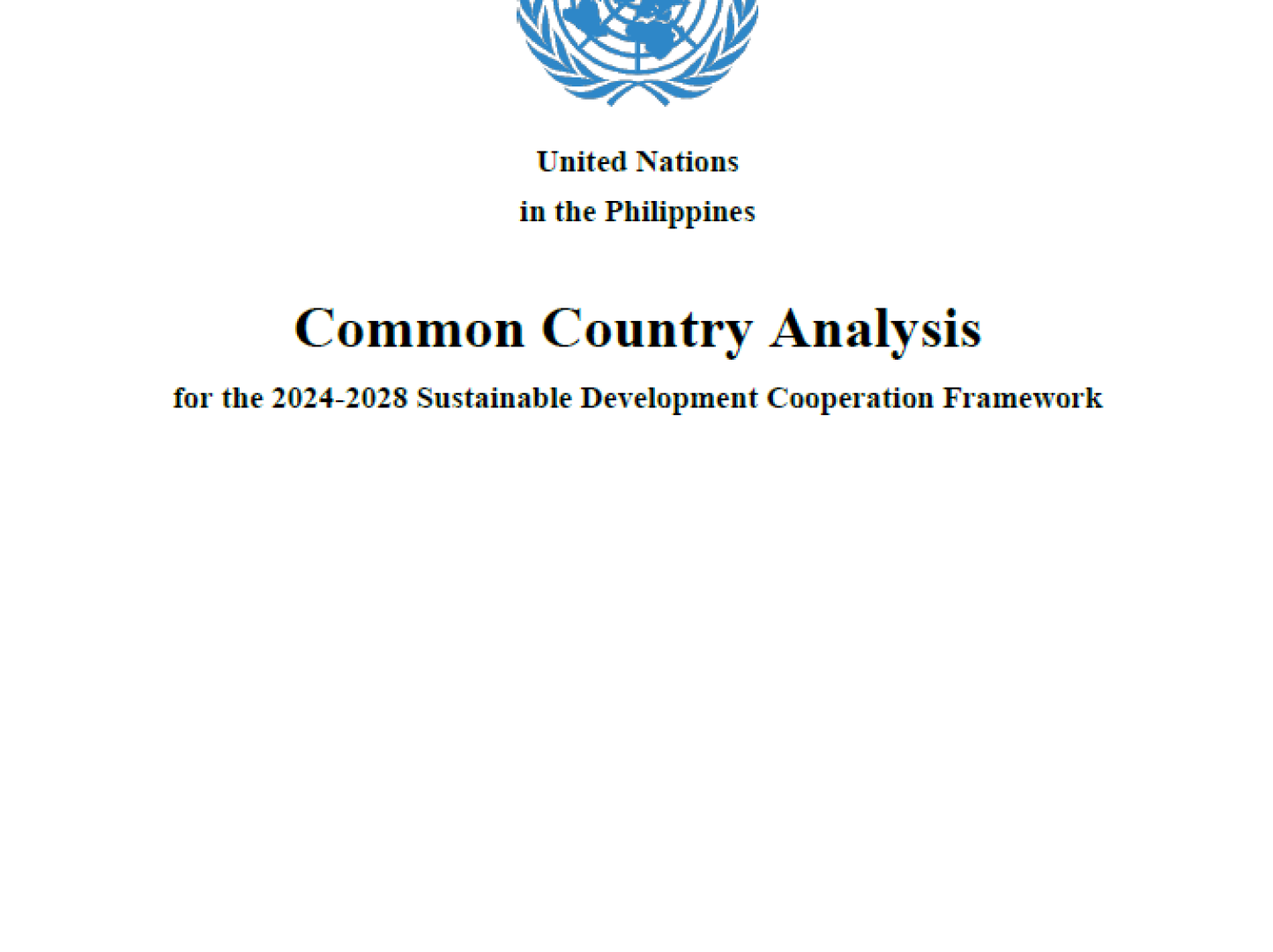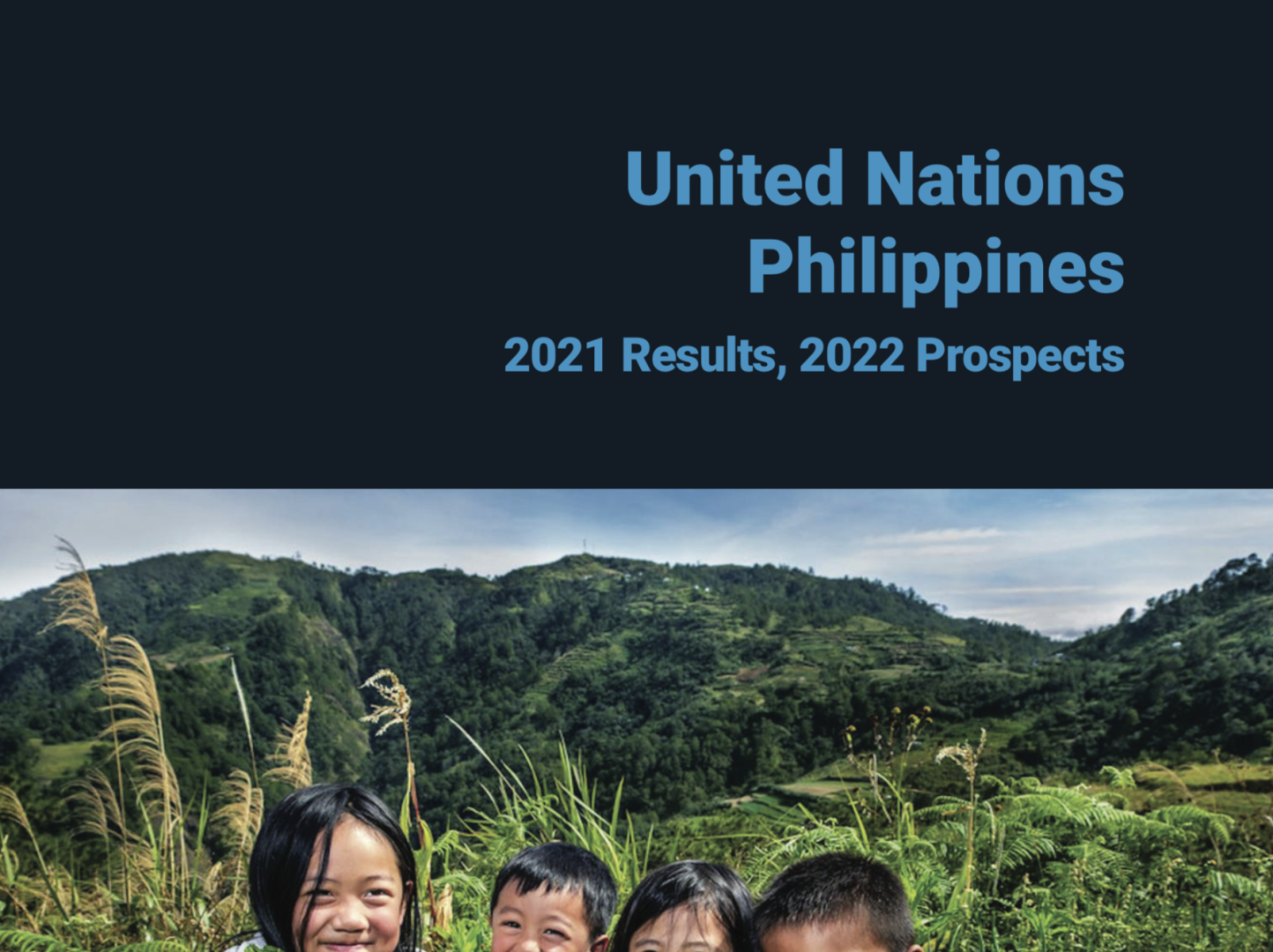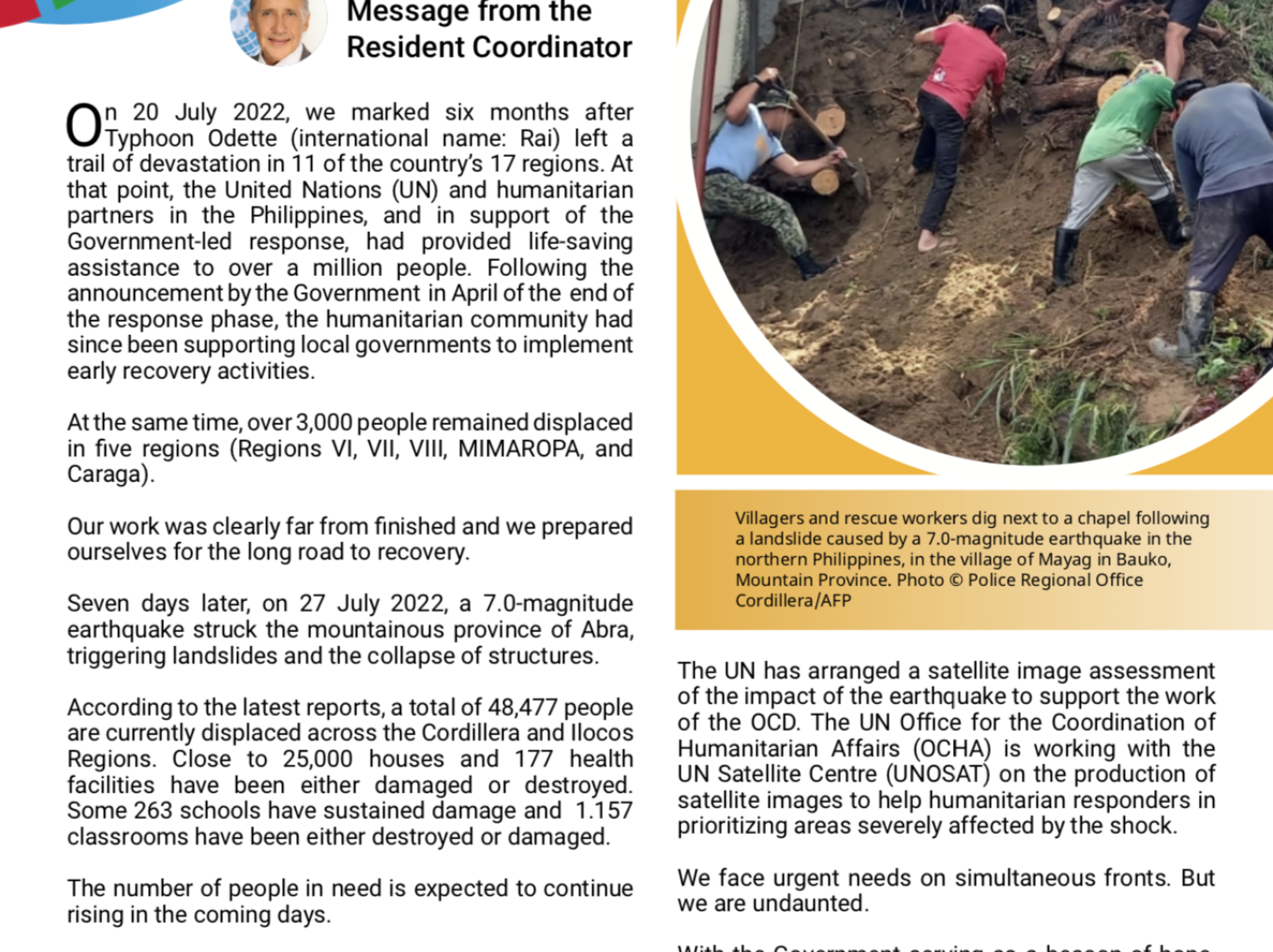Latest
Press Release
19 April 2024
Philippines joins UN Global Accelerator aiming to expand jobs and social protection
Learn more
Story
17 April 2024
UN emphasizes public health and human rights-based approaches at the Philippine Drug Policy Summit Launch
Learn more
Speech
17 April 2024
Speech of UN Philippines Resident Coordinator Gustavo Gonzalez at the Launch of the 2024 State of the World Population Report
Learn more
Latest
The Sustainable Development Goals in Philippines
The Sustainable Development Goals are a global call to action to end poverty, protect the earth’s environment and climate, and ensure that people everywhere can enjoy peace and prosperity. These are the goals the UN is working on in the Philippines.
Data in this section is currently being updated and under review.
Story
24 October 2023
Government of the Philippines and the United Nations embark on a new partnership for sustainable development
24 OCTOBER, MANILA, PHILIPPINES — The United Nations and the Philippine Government have signed today in the presence of President Ferdinand Marcos Jr. a landmark document that outlines the UN’s plan to support the country on its sustainable development path and accelerate local progress towards achieving the Sustainable Development Goals (SDGs) by 2030.
The UN Philippines Sustainable Development Cooperation Framework (CF) is the UN’s blueprint for action from 2024 to 2028, which will mobilize the global knowledge, capacities and resources of 23 UN entities supporting the country in addressing its major national priorities.
The new framework sets the stage for the UN’s shift from traditional development assistance to transformative strategic partnerships for policy and capacity development, knowledge generation and financial resources-leveraging by playing a strong development-enabling role.
“The new cooperation instrument is based on the principle that the magnitude and complexity of today’s development challenges requires collective and integrated responses. For such reason, the UN is mobilizing the best of its capabilities to effectively support the Philippines in its noble aspiration to become an upper middle-income country,” said UN Philippines Resident and Humanitarian Coordinator Gustavo González.
Co-created with the Philippine Government, the CF identifies three key priorities and outcomes, as well as the activities that need to be done to make this vision of a better future for the Philippines a reality.
First of these priorities is human capital development to ensure that by 2028, the Philippine population is more resilient to crises brought about by economic downturns, climate disasters, and public health risks. With this goal, the UN will work with an expanded range of partners to enhance good governance, accountability and human rights, maintain a healthy environment and improve the quality of and access to social services such as healthcare, education, and social protection. In this context, sustaining peacebuilding investments in the Bangsamoro region and other parts of the country will be critical for SDG acceleration.
The second priority underscored in the CF is sustainable and inclusive economic development and innovation, with the goal that by 2028, all people benefit from a more integrated, innovative, inclusive, and sustainable economy that generates decent work and livelihood opportunities.
Finally, the third key priority is climate action for environmental sustainability and disaster resilience. By investing in a just transition to low-carbon, climate-resilient development and cultivating a culture of sustainability in the management of natural resources and biodiversity, the UN and its partners hope to bolster current efforts to protect and preserve the country’s rich natural environment for the benefit of present and future generations.
The CF is ambitious to match the scope of the challenges we face, but it reflects the UN Country Team’s renewed and revitalized solidarity and commitment to a vision of a future where no one is left behind.
The 2024-2028 CF can be downloaded here [https://philippines.un.org/en/download/145870/250609].
Media contact
Maria Jorica Pamintuan I Public Information Assistant I United Nations Information Centre Manila I Mobile: 0917 8966191 I Email: maria.pamintuan@un.org
1 of 2
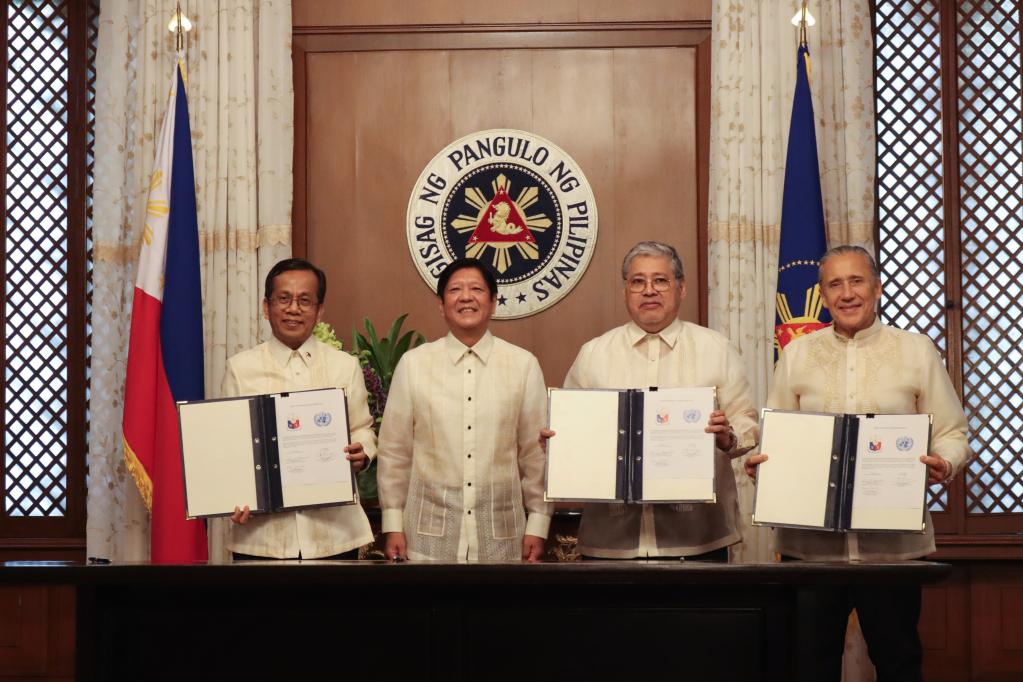
Speech
17 April 2024
Speech of UN Philippines Resident Coordinator Gustavo Gonzalez at the Launch of the 2024 State of the World Population Report
The speech was delivered during the launch of UNFPA's 2024 State of the World Population Report. Read more about the report's key findings here. -- Every year, I have the opportunity of joining the Government and UNFPA in the launch of one of the most relevant reports of the United Nations: the State of World Population report. This piece of research has been framing UN’s policies on development and population for decades. Thus, allow me to start by congratulating the Commission on Population and Development and my UNFPA colleagues for such valuable contribution to development. This year, the report focuses on “Ending Inequalities in Sexual and Reproductive Health and Rights”. Over the years we have learned about the tremendous impact that sexual and reproductive health can have on a country's development trajectory. We know that suitable access to sexual and reproductive health and rights can decrease child marriage, decrease teenage pregnancies and of course prevent a number of sexually transmitted infections. The report highlights two critical dimensions across population issues: “Inequality” and “Intersectionality”. On inequality, we still face significant inequities in access to sexual and reproductive health rights, worldwide. On intersectionality, sexism and racism have significantly influenced health structures, systems and services. More broadly, we also see that these two dimensions have slowed down progress towards the Sustainable Development Goals even here in the Asia-Pacific. Inequality shows that countries in special situations have experienced much slower progress compared to the rest of the region, and intersectionality reflects where some groups become disadvantaged and are at greater risk of being left behind depending on sex, education level, age, income, ethnicity and other factors. The report is, fundamentally, a call to action to partners involved in sexual and reproductive health and rights to: To promote inclusivity through greater mindfulness of intersectionality – that takes into account factors like ethnicity, race, and sexual orientation is vital for addressing inequities. To invest in sexual and reproductive health and rights and mainstream gender equality – because these benefit society as a whole and enables us to harness gender dividends. For us, the United Nations Country Team in the Philippines, our response to this call to action is captured in our United Nations Sustainable Development Cooperation Framework for 2024 to 2028. Under our first strategic priority on Human capital development, inclusion, and resilience building, we will contribute to government programs to facilitate access to maternal, newborn, child development, sexual and reproductive health services. We will work with government to improve resilience of and access to reproductive and child health services during emergencies. We will also enhance capacities of government institutions and civil society to protect women, children and vulnerable groups against violence and harmful practices. In closing, I would like to note that this State of the World Population Report 2024 is a great contribution to the on-going preparations for the UN Summit of the Future to be held in New York in September later this year. The Summit is intended to forge a new consensus on multilateralism to better meet the needs of the present while also preparing for the challenges of the future. Ending inequalities in sexual and reproductive health and rights will require a reinvigorated people-centered global architecture that is forward-looking and responsive to the needs not only of this generation but also the next one. Thank you.
1 of 2
Story
17 April 2024
UN emphasizes public health and human rights-based approaches at the Philippine Drug Policy Summit Launch
This launches a series of sectoral dialogues, which aims to inform the proposed amendments to the national drug legal framework to embody a public health approach that centers on human rights.The UN Joint Programme for Human Rights in the Philippines (UNJP), led by the UN Office on Drugs and Crime (UNODC), the Dangerous Drugs Board (DDB), and the Department of Justice (DOJ), convened representatives from various sectors at the University of the Philippines College of Law, the academic host for the dialogues. Government officials, civil society organizations, the academe, and development partners engaged in initial discussions on the new approach of the country to drug policy under a novel health, social, and developmental pillar in the Enhanced Philippine Drugs Strategy. Speaking at the event, UN Philippines Resident Coordinator Gustavo Gonzalez emphasized the importance of employing a comprehensive and holistic approach to drug policy and law reform. “As a problem rooted in socioeconomic circumstances, controlling drug use requires a more comprehensive approach. This means putting people first by ending stigma and discrimination, while strengthening prevention efforts,” he said.Gonzalez added, “This entails upholding the human rights of people who use drugs by providing prevention and treatment programmes, health services, etc. On the other hand, it also involves protecting communities by stopping drug traffickers who profit from people’s suffering and ensuring accountability for their actions.”The Philippine Drug Policy Summit is an initiative under the Human Rights-Based Approach to Drugs Technical Working Group of the UNJP. It has institutional support from various organizations, including the University of the Philippines Institute of Human Rights, Initiatives for Dialogue and Empowerment through Alternative Legal Services (IDEALS), Drug Policy Reform Initiative (DPRI), NoBox Philippines, IDUCare, StreetLaw PH, and the Institute of Politics and Governance.The sectoral dialogues are scheduled for 8-24 May. The UNJP invites civil society partners and stakeholders to engage in open and meaningful conversations to promote and protect the health, lives, and well-being of Filipinos through evidence-informed, scientific, and human rights-based drug policies.
1 of 5
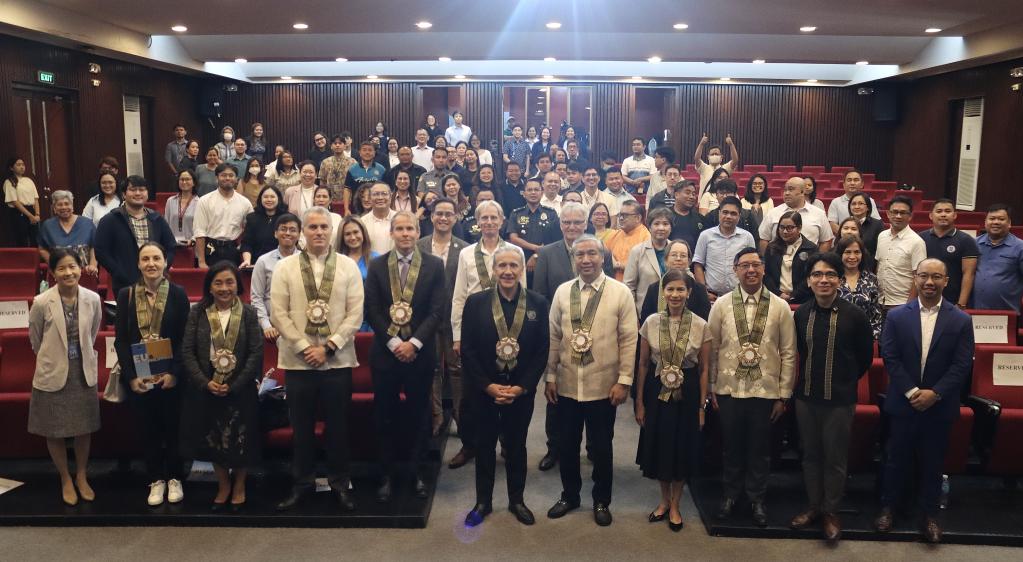
Story
13 November 2023
DOH, UN sign agreement to address malnutrition in the Philippiness
13 November 2023
The Department of Health (DOH), along with United Nations (UN) agency partners, UNICEF and the United Nations Office for Project Services (UNOPS), and World Bank inked a memorandum of understanding formalizing the partnership in addressing malnutrition in the Philippines.
As part of the broader Philippine Multisectoral Nutrition Project (PMNP), a four-year project spearheaded by the DOH and co-led by the Department of Social Welfare and Development (DSWD), this agreement adopts a bold multi-sectoral approach to achieve nutrition-specific and nutrition-sensitive interventions across 235 local government units (LGUs) in Luzon, Visayas, and Mindanao, as well as 40 municipalities in the Bangsamoro Autonomous Region of Muslim Mindanao (BARMM).
This project aims to increase the utilization of a package of nutrition-specific and nutrition-sensitive interventions and improve key behaviors and practices known to reduce stunting. It also enhances the capacity of the DOH and will support the delivery of nutrition and health care services at the primary care and community levels in municipalities known to have a high incidence of poverty and malnutrition.
"Improving the nutritional status of children is crucial for achieving the country's goals of enhancing human capital, strengthening economic recovery, and fostering long-term growth," said Ndiame Diop, World Bank Country Director for Brunei, Malaysia, Philippines, and Thailand.
The partnerships formalized today with UNICEF and UNOPS, as implementing partners, aim to strengthen primary health care and nutrition service delivery. This will be achieved through the provision of healthcare equipment and supplies, basic primary care and nutrition commodities, multisectoral information systems development for localized decision-making, capacity building for frontline healthcare workers, community health navigation, and health and nutrition leadership and governance for local chief executives. Additionally, the partnerships will focus on social behavior change and communication (SBCC), verification of LGU performance and finance systems for the performance-based grants, as well as project measurement and evaluation.
“Good nutrition is a fundamental child’s right. The need for healthy diets, multisectoral services, and practices that protect, promote, and support good nutrition has never been greater. By strengthening national and local systems and improving access to essential services in communities, we can help children not only survive but thrive. UNICEF is committed to supporting efforts to end child stunting, ensuring that every child has the opportunity to grow and develop to their full potential," said UNICEF Philippines Representative Oyunsaikhan Dendevnorov.
This is also in association with the community-driven development approach of DSWD Kapit-bisig Laban sa Kahirapan Comprehensive and Integrated Delivery of Social Services (KALAHI-CIDSS), where to date implementing communities have initiated more than 3,000 procurement packages using the community-based procurement system, with over 600 contracts successfully fulfilled. All these efforts are dedicated to improving access to and utilization of clean water, proper sanitation, enhanced hygiene practices (WASH), and access to Early Childhood Care and Development (ECCD) services.
"When children have better nutrition, they learn better. They can create opportunities to gradually break the cycles of poverty and hunger. By working together in the Philippine Multisectoral Nutrition Project, UNOPS and its partners will reach those furthest behind and help achieve the SDGs”, said UNOPS Philippines Country Manager, Oscar Marenco.
The partnership between the DOH and the UN will enhance the DOH's access to global expertise and resources, thereby expanding its knowledge base and network. Leveraging the UN's global portfolio of programs and initiatives, the DOH will gain a wealth of information and best practices, enabling it to enhance and optimize its public health programs and services.
“The PMNP is a recognition that nutrition is not just a matter of health. The Marcos Administration sets this intervention as part of its foundation for social and economic development by ensuring women and children’s access to the first 1,000 days of services as a critical investment in our country’s human capital. This collaboration between the DOH and the UN is a testament to our shared commitment to building a healthier and better future for the Filipino people, especially women and children," said DOH Secretary Teodoro Herbosa.
--------------------
Media Contacts
Mario Villamor, (mariovi@unops.org)
Marge Francia, (mfrancia@unicef.org)
1 of 5
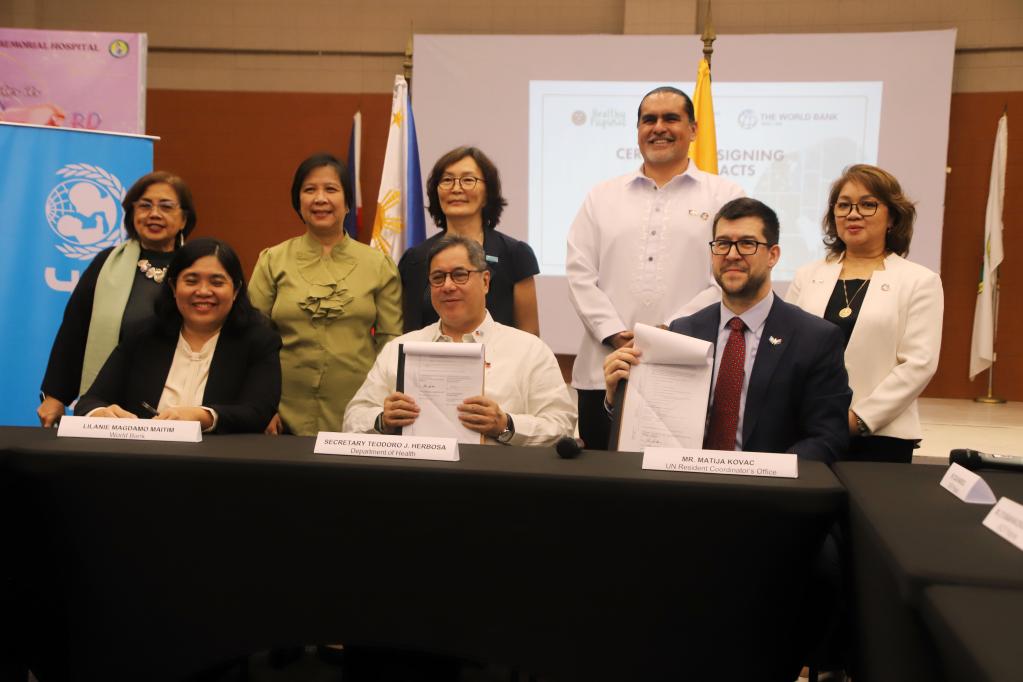
Story
30 October 2023
UNEP honors Quezon City mayor for environmental policy leadership
Quezon City Mayor Josefina “Joy” Belmonte’s commitment to environmental protection can be traced to the aftermath of the worst storm to hit the Philippines in decades.
When Typhoon Ketsana struck in 2009, it unleashed ferocious downpours and floods that submerged roads and forced residents onto their rooftops for refuge. As the floodwaters receded, they left a river of plastic bags, sachets and other litter in their wake.
That sight left a lasting impact on Belmonte, who successfully ran for vice mayor of Quezon City in 2009 before becoming its mayor in 2019.
“I'm a good governance advocate,” Belmonte told the United Nations Environment Programme (UNEP). “Good governance involves good stewardship of the environment.”
Only the second female mayor in the history of Quezon City, home to 3.1 million, Belmonte has pursued a raft of policies to end plastic pollution, counter climate change and green the city.
For her efforts to transform Quezon City into an environmental trailblazer, Belmonte has been named the 2023 Champion of the Earth for Policy Leadership, one of the UN’s highest environmental honours.
“Mayor Josefina Belmonte’s passionate leadership and policy achievements exemplify how local authorities can solve global environmental problems,” said Inger Andersen, Executive Director of UNEP. “Cities can be the dynamic engines of change we need to overcome the triple planetary crisis of climate change, nature and biodiversity loss, and pollution and waste – and mayors can help to lead that charge.”
Fighting the throwaway culture
Quezon City was the Philippines’ capital for 27 years until the title returned to Manila in 1976. Today, it is the country’s most populous city and is part of Metro Manila.
Belmonte’s connections to this place run deep. Not only was she born and raised here, but her father, Feliciano “Sonny” Belmonte, was its ninth mayor.
Despite an early exposure to politics, Belmonte’s interests initially led her elsewhere – including to a career as an archaeologist. But in the end, the call to public service proved too strong.
“If you can be in a position where you can be a source of inspiration to others and become the root of positive change for millions of people, then it is worth it,” she said.
For Belmonte, positive change means prioritizing action on the environment to create a liveable, green and sustainable city.
Under Belmonte’s leadership, Quezon City has focused on reducing plastic pollution and extending the life of plastic products already in circulation.
“Plastic pollution is a major problem in the Philippines, as in many parts of the world, because of the throwaway culture,” Belmonte said. “Plastics clog our drainage systems and end up in the oceans. We know that plastic waste becomes microplastics that can be consumed in the food we eat, the air we breathe and even in the water we drink, which affects our health.”
Globally, humanity’s addiction to short-lived plastic products has created an environmental catastrophe. Around 19 to 23 million tonnes of plastic annually leaks into aquatic ecosystems, polluting lakes, rivers and seas. To stem that flow, experts say the world must fundamentally alter its relationship with plastic by using less of the material, eliminating single-use products, reusing what plastics are produced and finding environmentally friendly alternatives.
Under Belmonte, Quezon City has banned single-use plastic bags, cutlery, straws and containers in hotels, restaurants and fast-food chains for dine-in customers, as well as single-use packaging material.
Since 2021, residents have been able to trade in their recyclables and single-use plastic products for environmental points that can be used to buy food and pay electricity bills under the “Trash to Cashback” scheme. City authorities have even started a “Vote to Tote” programme to turn tarpaulins used in election campaigning into bags.
Still, millions of single-use plastic sachets are thrown away every day in the Philippines, which is a major source of ocean plastics. Though sachets allow households more affordable access to essentials for cooking, hygiene and sanitation, they cannot be recycled effectively, causing serious environmental harm, experts say.
“Sachet culture really gets to me. It really is something that makes me angry because it is there because we are a poor country,” Belmonte said. “Major manufacturers need to do their part and change the way they package products to make them more environmentally friendly.”
To combat plastic pollution, Belmonte launched in 2023 an initiative to help put refill stations for essentials, such as washing-up liquid and liquid detergent, in convenience stores across the city. With products that are often less expensive than their packaged counterparts, the stations have been received positively and will be piloted in over 6,000 stores next year, Belmonte said.
Last year, a historic UN resolution was passed to develop a legally binding international instrument to end plastic pollution. Belmonte has been vocal about the need for a “truly ambitious” global instrument.
“Mayors want to be part of the negotiating table because we have very practical experience to bring,” she said. “The real work is at the level of cities. We already know that when change happens at the level of cities, it happens much more rapidly.”
Earning trust
Under Belmonte, Quezon City has also developed an ambitious plan to reduce its carbon emissions by 30 per cent in 2030 and reach net-zero by 2050. It has declared a state of climate emergency to unlock spending, amounting to 11–13 per cent of the city’s annual budget, on programmes that mitigate the impacts of the climate crisis.
There are plans to double the number of parks in the city, introduce more electric buses and almost quadruple the network of bike lanes by 2030 to fight pollution. Other green initiatives include promoting urban farming and deploying equipment that allows community farms to transform organic waste into methane gas that can be used for cooking.
Although Belmonte has worked hard to forge her own path, she considers one piece of advice from her father to be priceless: “Always spend time with the people. Especially go to the poor communities, because when you go to the communities and you see how difficult life is for people in the grassroots, you'll never think of abusing power.”
It is advice that has shaped her political approach, helped her to build public trust and contributed to her popularity among voters. She was re-elected mayor in 2022 and regularly scores the highest approval ratings among metro Manila’s mayors.
“People will buy into your vision if you value what they have to say. That is the best way to get all of our environmental issues across,” Belmonte said.
About the UNEP Champions of the Earth
The United Nations Environment Programme’s (UNEP) Champions of the Earth honours individuals and organizations whose actions have a transformative impact on the environment. The annual Champions of the Earth award is the UN’s highest environmental honour. #EarthChamps
About the #BeatPollution campaign
To fight the pervasive impact of pollution on society, UNEP launched #BeatPollution, a strategy for rapid, large-scale and coordinated action against air, land and water pollution. The strategy highlights the impact of pollution on climate change, nature and biodiversity loss, and human health. Through science-based messaging, the campaign showcases how transitioning to a pollution-free planet is vital for future generations.
1 of 5
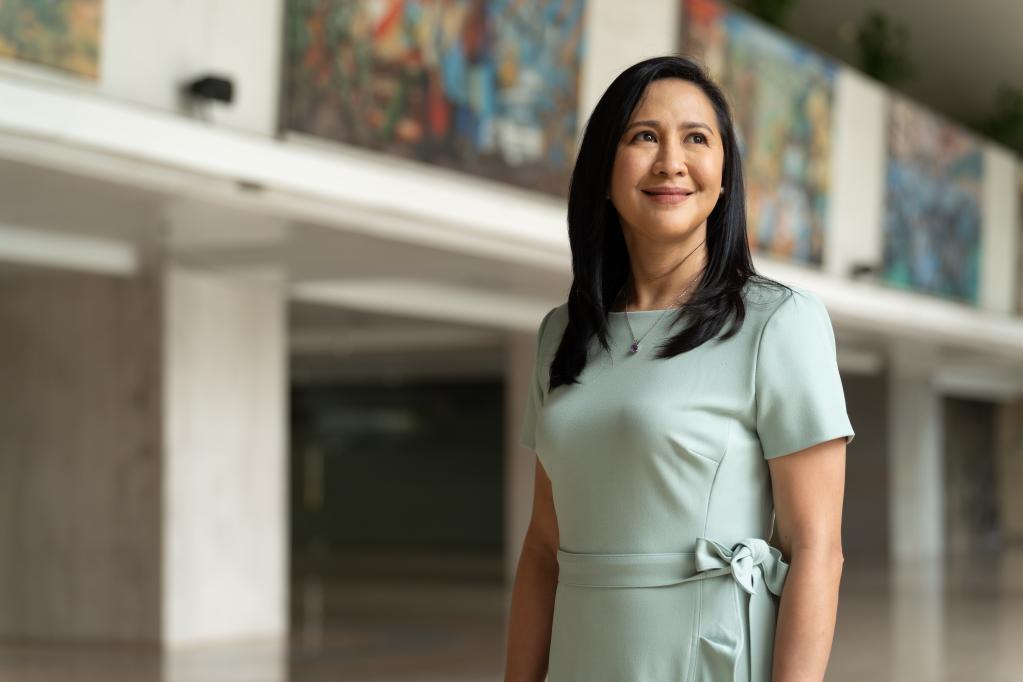
Story
28 October 2023
Over 200 mayors meet on SDG acceleration at Philippine Mayors Forum
27 OCTOBER, MANILA—The United Nations (UN) and the Department of the Interior and Local Government (DILG) convened over 200 local chief executives at the Philippine Mayors Forum to discuss how local government units (LGUs) can help contribute to the achievement of the Sustainable Development Goals (SDGs).
The forum was organized to accelerate implementation of the the SDGs at the local government level through the sharing of best practices on sustainable urban development, multi-level governance, and the use of digital technology.
In his keynote speech, Philippine President Ferdinand Marcos Jr. said, “It was an inspired revelation for the UN to recognise that it will need local government assistance. We are talking about global issues here, but we depend on the local government.”
“I welcome this forum which seeks to harness the power of innovation, digital governance, resiliency-building to ensure that the government can better respond to the demands of the times. And when I speak of government, I speak of government at every level,” he added.
DILG Secretary Benjamin Abalos Jr. also underscored the critical role played by cities: “The road to sustainable development runs through cities.”
UN Resident Coordinator Gustavo González further emphasized the need to coordinate action on the SDGs with LGUs as part of the Philippines’ whole-of-nation approach to development.
“Local governments are closer to the level where actions are more likely to produce measurable results in a more responsive and inclusive process. They are first responders in challenging situations, as well as critical engines in transforming the lives of people,” he said.
Around two-thirds of SDG targets are expected to be met in or by cities and municipalities.
The UN also introduced the recently signed Sustainable Development Cooperation Framework during the forum and discussed how the UN Country Team in the Philippines works with and supports LGUs on SDG localization.
1 of 5
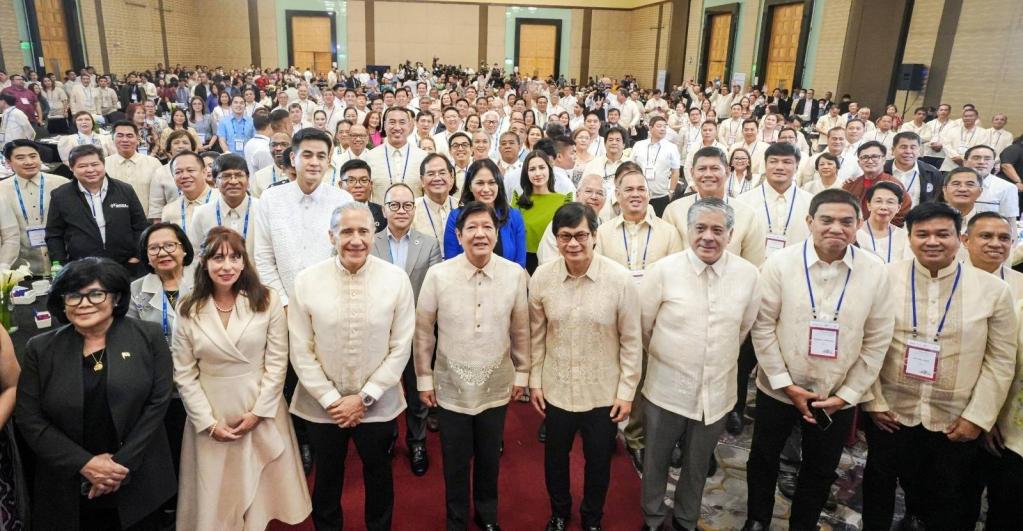
Story
23 October 2023
Pending bills on human rights tackled in UN discussion
23 OCTOBER, MANILA—The United Nations Joint Programme for Human Rights in the Philippines (UNJP) convened today representatives from the Commission on Human Rights (CHR), Philippine Congress, academe and civil society organizations to strengthen human rights approaches on key pending legislation.
Among the bills discussed include four filed in the Senate covering the protection of human rights defenders (Senate Bill [SB] 2447), the CHR Charter (SB 2440), anti-discrimination (SB 1264), and the establishment of a Forensics Institute (SB 694).
Two bills filed in the House of Representatives were also tackled, concerning the establishment of the National Preventive Mechanism (House Bill [HB] 8780), and a bill on mandatory autopsy (HB 8384).
The roundtable discussion was organized to promote human rights in these proposed laws, particularly their compliance with national and international human rights standards and good practices.
“Parliaments are the guardians of human rights,” said UN Philippines Resident Coordinator Gustavo González, adding that members of Congress play a vital role in ensuring that national laws cover the spectrum of citizens’ political, civil, economic, social and cultural rights.
He added, “Legislators also play a crucial oversight role in ensuring government compliance with international human rights obligations and translating them into national legislation and policies.”
CHR Chairperson Richard Paat Palpal-latoc underscored the importance of the discussion, saying, “These bills play an integral role in our shared aspirations for human rights and society.”
“Let us continue to work together on the passage of these bills as doing so will result in impactful outcomes that will change the lives of many for the better,” he said.
1 of 5
Press Release
19 April 2024
Philippines joins UN Global Accelerator aiming to expand jobs and social protection
The inter-ministerial Social Development Committee (SDC), chaired by the Secretary of the Department of Labor and Employment (DOLE) has confirmed its commitment for this programme to facilitate just transitions towards the achievement of the Sustainable Development Goals. The interest from the Philippines highlights the alignment of the Global Accelerator objectives with the country’s development frameworks, particularly the Philippine Development Plan (PDP) and the Philippine Labor and Employment Plan (PLEP) for 2023-2028, said Secretary Bienvenido Laguesma of DOLE. These frameworks have been reinforced by the Trabaho Para sa Bayan (TPB) Plan whose inter-agency council shall be the national steering committee in implementing the roadmap/s under the Global Accelerator. “These underscore as a priority the creation of employment opportunities and that is where support from the new initiative will be crucial,” he said on behalf of the SDC.The Global Accelerator will support pathfinder countries like the Philippines to align national policies, close gaps and channel investments for social impact. It will help address coverage and financing gaps for universal social protection, create decent work, protect communities from climate change and other risks, and facilitate just transitions initially in the construction and transport sectors. With its potential to make a real difference in the lives of millions of people around the world, the Global Accelerator will also enhance multilateral cooperation for joint implementation, said Gustavo Gonzalez, the United Nations Resident Coordinator for the Philippines.“The Philippines’ participation as one of the Pathfinder Countries in the Global Accelerator will maximize UN support to bolster the country’s efforts to ensure full, decent and productive employment for every Filipino,” he said. “This global initiative has great potential to fast-track the realization of development objectives.”The engagement process with the Global Accelerator started in 2023 with various national consultations that included international financial institutions, UN agencies, development partners, government agencies and other partners. On 28 February 2024, the Global Accelerator was presented to the Social Development Committee at the Cabinet level, which endorsed the country's engagement in the initiative.The International Labour Organization (ILO), the United Nations Development Programme (UNDP), the United Nations Children’s Fund (UNICEF), will actively support the Global Accelerator in the Philippines.Following the official commitment, the Trabaho Para sa Bayan (TBP) Inter-agency Council will serve as the National Steering Committee. The council will support the design and implementation of the national development roadmap and foster collaboration among the actors involved, including workers and the private sector. The national roadmap will set the direction and the entry points of the Global Accelerator in the Philippines.The Philippines has already joined the Global Coalition for Social Justice, a UN-breaking initiative to reduce inequalities, promote decent work and advance social justice.
1 of 5
Press Release
01 March 2024
UN, PCW, SM Cares kick off Women’s Month with exhibit, illumination of malls
To kick off Women's Month, the United Nations Philippines, Philippine Commission on Women and SM Cares are collaborating on a series of events to champion women's empowerment.SM Malls Illuminate for Women's MonthIn a gesture of solidarity, participating SM malls across the Philippines (North EDSA, Aura, Mall of Asia, Megamall, Cebu, Lanang in Davao) will illuminate their buildings’ facade purple for March 1. From March 1 to 31, select LED assets inside and outside the participating malls will also feature a short video with key messages for Women’s Month. The video will play at prominent locations such as SM Megamall, SM MOA Arena, SM Mall of Asia Arena Annex (MAAX) Eye, SM Seaside City Cebu, SM City Clark, SM North Edsa, SM Fairview, and SM Sto.Tomas, as well as on digital directories in SM malls nationwide."Walk In Her Shoes" Traveling Exhibit An interactive traveling exhibit dubbed "Walk In Her Shoes" will be displayed on the 3rd floor of SM North on March 1st. This compelling showcase features narratives from women and girls, shedding light on different forms of gender-based violence they experience. The exhibit strives to raise awareness about the widespread nature of violence against women (VAW), encourage reflection on harmful social norms, and inspire collective action to end VAW.“Significant progress has been made in empowering women and girls, but the promise of gender equality remains unfulfilled for far too many, especially those from vulnerable groups. To achieve our goals for a just and equitable world, we must decisively increase investment in women, especially their health, education and overall well-being," said United Nations Philippines Resident Coordinator Gustavo Gonzalez.Gonzalez thanked the Philippine Commission on Women for leading efforts to empower women and for SM Cares and SM Supermalls for providing the space and platform to raise awareness about gender inequality and gender-based violence."Gender equality demands a whole-of-government, whole-of-society approach. Only through collaboration across sectors can we dismantle harmful norms and build a world where women and girls enjoy the same rights and opportunities as men,” he said, adding that gender equality also has economic impacts as it results in sustainable development.The PCW shares that the Philippines ranks 16th globally with a 79.1% parity score. It stands as the second-best in East Asia and the Pacific and remains the sole Asian nation within the top 20. But the reality remains, if this pace goes on, we may not live to see the day where women are treated equally as men, on all fronts. Hence, the Commission calls on everyone to double down on efforts towards gender equality.One way of sparking conversations on women’s rights is the Purple Your Icon advocacy initiated by the Philippine Commission on Women as part of the annual National Women’s Month celebration. This encourages everyone to light up or decorate their offices, landmarks, and places in purple.PCW Officer-in-Charge Atty. Khay Ann Magundayao-Borlado extended the agency’s gratitude to SM Supermalls for joining this campaign by lighting up different malls in purple across the country and the UN Philippines for being one of its steadfast partners in this advocacy. “Adorning our surroundings this month serves not only as a beautiful tribute, but also as a powerful symbol. Purple signifies the spirit of women's rights, highlighting the fight for equality and empowerment. It represents a future where limitations and stereotypes are transcended,” said Atty. Magundayao-Borlado. SM Supermalls, through its social responsibility arm - SM Cares, champions women's empowerment, health, and welfare. The company strives to build a future where every woman feels valued, respected, and empowered to reach her full potential.This commitment extends far beyond a single month, emphasizes Atty. Pearly Joan J. Turley, SM Cares Program Director for Women and Breastfeeding Mothers. "By collaborating with organizations like the Philippine Commission on Women (PCW), Department of Labor and Employment (DOLE), and United Nations, we actively ensure compliance with RA 11313 or the Safe Spaces Act (Bawal Bastos Law) by conducting mandatory orientation sessions for our own employees, agency personnel, and tenant employees to foster a safe, inclusive, and empowering environment for everyone visiting our malls."Recognizing that investing in violence prevention is critical, SM encourages other groups to join the effort in building a safer, more inclusive and equitable society.Among the United Nations Gender Thematic Group (UN GTG) agencies that contributed to the “Walk in Her Shoes” exhibit are UNFPA, UN Women, UNICEF, UN Development Programme (UNDP), International Labour Organization, World Food Programme, United Nations Industrial Development Organization (UNIDO), and Food and Agriculture Organization (FAO). UNFPA Philippines works with its partners in empowering women by (1) advocating for policies that protect women’s and girls' right to make informed choices about their bodies, (2) addressing gender-based violence and harmful practices by challenging discriminatory norms and strengthening response mechanisms for GBV survivors, and (3) ensuring the protection of women in humanitarian settings through supporting the provision of essential reproductive healthcare and gender-based violence support systems.Call to ActionThe public is encouraged to visit the "Walk In Her Shoes" exhibit at the SM North’s City Center Level 3 from March 1-10, and to engage with the Women's Month illumination campaign at participating SM malls nationwide. “Together, let's create a world where women and girls enjoy freedom from violence and discrimination.”### For more information contact:Maria Jorica Pamintuan | Public Information | United Nations Philippines
maria.pamintuan@un.org
Nevi Calma | Information Officer | Philippine Commission on Women
media@pcw.gov.ph
maria.pamintuan@un.org
Nevi Calma | Information Officer | Philippine Commission on Women
media@pcw.gov.ph
1 of 5
Press Release
12 February 2024
What we know so far about effective prevention of violent extremism
Today, 12 of February, we observe the International Day for the Prevention of Violent Extremism as and when Conducive to Terrorism. The declaration of this day stems from a resolution of the United Nations General Assembly, and it aims to raise awareness of the threats linked to violent extremism and to enhance international cooperation to address this complex and multidimensional issue.
Violent extremism is neither new nor exclusive to any region, nationality or system of belief. No country or region is immune from its impacts. In 2019 alone, violence and conflict inflicted an estimated $14.4 trillion blow to the global economy — equivalent to 10.5 per cent of global gross domestic product (GDP) or $1,895 per person.
Threats or risks of terrorism deter investments – a 5% fall in net Foreign Direct Investment position of the country, say experts , diverting resources from economic and social programmes to the security sector.
While there is consensus that violent extremism and terrorism negatively impact development, not all of us have the same understanding of strategies, approaches or instruments to combatting them. Governments have the primary responsibility of ensuring security, respecting human rights, upholding the rule of law and countering discrimination, exclusion and marginalization. Civil society organizations are often well-placed, knowledgeable, and experienced in identifying and addressing the grievances that make individuals more vulnerable to radicalization and violent extremism, leveraging their expertise and community connections. Experience also shows that private sector actors also have unique capacities—and resources—that can make them strategic partners for Governments.
A frequent term used by policymakers to describe the collective investment needed to fight violent extremism is the “whole of society approach”. However, this convenient shortcut risks oversimplifying the complexities of social dynamics, internal division of labor, roles, responsibilities, power imbalances and exclusions. Governments and civil society organizations must overcome stereotypes from each other and collaborate professionally, with clear delineation of roles and responsibilities. Governments are expected to provide civil society and private sector stakeholders with the legal and political space they need to engage with those vulnerable to violent extremism. Civil society is expected to give critical feedback to government actors, including when officials overstep or fail to fulfill their duties. Police and other security forces are expected to avoid instrumentalizing civil society organizations to gather criminal intelligence and detect threats within communities. Antagonistic approaches – and I can refer to my own professional experience — do not bring the desired results; on the contrary, they exacerbate existing divisions, limit information flows which would allow governments to address grievance through peaceful means and weaken much needed social trust.
As we are learning, violent extremism is not only to be combated, but it also can be prevented. And this is the most interesting and complex part of the “whole of society approach”. Radicalization doesn’t happen in a vacuum. It’s not a spontaneous phenomenon of history that can easily discharge us from any responsibility. The alienation of a high number of youths, who join terrorist organizations doesn’t happen overnight. And the causes cannot just be reduced to a lack of income or employment for youths, as we sometimes oversimplify in our forums. Understanding and addressing the root causes of violent extremism and terrorism requires, in many cases, a critical historic analysis in addition to genuine discussions with youth and others at risk of radicalization.
So far, we know that the inability of a society to engage youths in meaningful ways and to provide opportunities for individual fulfillment of political, social, economic, cultural, religious aspirations, risks exacerbating preexisting gaps and frustrations that can be easily exploited by violent-ideology organizations.
Preventing violent extremism requires a comprehensive, long-term investment encompassing education, institutional behavioral changes and prioritization of early warnings and anticipatory actions. National budgets are good indicators to assess if prevention is a political priority for a given administration. We have to also admit that prevention, as a long-term project, does not always attract the interest of political short-termism.
We are also learning that terrorism is becoming a fluid and amorphous phenomenon that combines military non-State armed groups, organized crime networks, engaged in a wide range of illicit trafficking from small arms and light weapons to the latest security and communication technology. In addition, not all terrorist-induced violence is linked to armed conflict. We experience the emergence of powerful software tools that can spread and distort content instantly and massively heralds a qualitatively different, new reality. Violent extremism and terrorism have also an evident gender dimension. Women and girls are continuously and often disproportionately affected by acts of violent extremism. It’s not a surprise that gender inequality and misogyny are central to the propagation of violent extremism.
The adoption in 2016 of the UN Secretary General’s Plan of Action to Prevent Violent Extremism provided a comprehensive approach to addressing the underlying conditions behind violent extremism conducive to terrorism. ASEAN countries, including the Philippines, were among the first in the world to adopt their own regional Plan of Action in 2018.
Cooperation between the Government of the Philippines and the United Nations in preventing violent extremism and terrorism has significantly increased in recent years. The United Nations Office of Counterterrorism (UNOCT), the United Nations Office of Drugs and Crime (UNODC), the Office of the United Nations High Commissioner for Human Rights (OHCHR) and the United Nations Development Programme (UNDP) have been leading technical assistance in such sector, assisted by many other UN entities to ensure holistic and integrated support to the country. I am glad to confirm that our new 2024-2028 UN Development Cooperation Framework, signed with the Government on 24 October last year will enhance such partnership with a strong prevention and resilience building approach.
Prevention and sustainable development are interdependent and mutually reinforcing. In this context, full achievement of the 2030 Agenda and the Sustainable Development Goals remains critical, both in their own right and because sustainable development is ultimately the only way to comprehensively address the interlinked, multidimensional drivers of violence and insecurity.
by UN Resident and Humanitarian Coordinator in the Philippines, Gustavo Gonzalez
1 of 5
Press Release
14 December 2023
NOTIFICATION: Scams for soliciting money, implying association with United Nations agencies
The United Nations NEVER charges any fees from partner communities at any stage of project implementation, nor in procurement or recruitment processes.
We wish to warn the public of these scams, where “fees” or “investments” are collected by fraudsters falsely claiming association with and using images of the United Nations and its specialized agencies, including the Food and Agriculture Organization (FAO), the International Fund for Agricultural Development (IFAD), and the World Food Programme (WFP).
Do not be fooled: People involved in these fraudulent activities may present realistic-looking identification and documents to support their claims, which promise funds or other benefits, such as livelihood and humanitarian assistance, employment opportunities, and interest-free loans.
Suspicious communications or proposals purportedly from, for or on behalf of the FAO, IFAD, and WFP — or any other United Nations entity — should immediately be reported to philippines@un.org, or through the following channels:
• FAO: abuse@fao.org | fao-ph@fao.org
• IFAD: abuse@ifad.org
• WFP: philippines.feedback@wfp.org | 0917 528 9392 (Globe) or 0947 896 5091 (Smart)
Victims of such scams are strongly encouraged to immediately reach out to local authorities for assistance.
The United Nations reports fraudulent schemes to local law enforcement for appropriate action. We appreciate the public’s help in bringing misleading practices that harm the people in the Philippines to our attention.
1 of 5
Press Release
07 December 2023
European Union, Australia and UN support the Philippines' first National Jail Decongestion Summit
MANILA – The Philippine Government, in cooperation with the Justice Sector Coordinating Council (JSCC) composed of Supreme Court Chief Justice Alexander G. Gesmundo, Justice Secretary Jesus Crispin C. Remulla, and Interior and Local Government Secretary Benjamin C. Abalos, Jr., is convening the country's first National Jail Decongestion Summit entitled, "Decongest and Reintegrate: A conference to unlock solutions to jail and prison overcrowding" at the Diamond Hotel Manila on 6 and 7 December 2023.
Providing messages at the opening ceremonies were His Excellency President Ferdinand R. Marcos, Jr. (Delivered by Executive Secretary Lucas P. Bersamin), Senate President Juan Miguel F. Zubiri, House Speaker Ferdinand Martin G. Romualdez, European Union Ambassador, H.E. Luc Veron, Australian Ambassador, H.E. HK Yu PSM, FCPA, and UNODC Country Manager, Daniele Marchesi.
Also joining the Summit are Supreme Court Associate Justice Maria Filomena D. Singh, Chairperson of the JSCC Technical Working Group on Processes and Capacity Building, and other Justices of the Supreme Court, and Christian Eldon of the European Union’s GOJUST II Programme.
The Summit aims to bring together key stakeholders, advocates, law enforcement officials, legal experts, and community leaders, among others, to tackle the challenges and explore viable solutions to alleviate overcrowding in jails, feature panel discussions, keynote addresses, and interactive sessions designed to examine the root causes of jail overcrowding, to share best practices, and develop innovative strategies for reform. Attendees will have the opportunity to engage in critical conversations aimed at fostering real time solutions towards sustainable jail reforms.
This Summit is jointly supported by the European Union's Justice Sector Reform Programme: Governance in Justice II (GOJUST II) and the United Nations Office on Drugs and Crime (UNODC), with funding from the Australian Government and the European Union.
1 of 5
Latest Resources
1 / 11
Resources
25 October 2023
Resources
01 November 2023
Resources
27 June 2023
1 / 11

